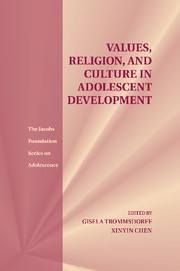Book contents
- Values, Religion, and Culture in Adolescent Development
- Series page
- Values, Religion, and Culture in Adolescent Development
- Copyright page
- Dedication
- Contents
- Contributors
- Preface
- Acknowledgments
- Part One Theoretical Perspectives on Values, Religion, and Adolescent Development in Cultural Context
- Part Two Universal and Culture-specific Functions of Adolescent Values and Religion
- Part Three Impact of Values and Religion on Adolescent Adjustment in Times of Social Change
- Part Four Socialization Processes of Values and Religion in Adolescent Development
- 14 Attachment and Religious Development in Adolescence The Implications of Culture
- 15 Cross-Cultural Perspectives on Adolescents’ Religiosity and Family Orientation
- 16 Religion and the Intergenerational Continuity of Values
- 17 Adolescents’ Social Development and the Role of Religion
- 18 Hindu Religious Values and Their Influence on Youths in India
- Index
17 - Adolescents’ Social Development and the Role of Religion
Coherence at the Detriment of Openness
from Part Four - Socialization Processes of Values and Religion in Adolescent Development
Published online by Cambridge University Press: 05 September 2012
- Values, Religion, and Culture in Adolescent Development
- Series page
- Values, Religion, and Culture in Adolescent Development
- Copyright page
- Dedication
- Contents
- Contributors
- Preface
- Acknowledgments
- Part One Theoretical Perspectives on Values, Religion, and Adolescent Development in Cultural Context
- Part Two Universal and Culture-specific Functions of Adolescent Values and Religion
- Part Three Impact of Values and Religion on Adolescent Adjustment in Times of Social Change
- Part Four Socialization Processes of Values and Religion in Adolescent Development
- 14 Attachment and Religious Development in Adolescence The Implications of Culture
- 15 Cross-Cultural Perspectives on Adolescents’ Religiosity and Family Orientation
- 16 Religion and the Intergenerational Continuity of Values
- 17 Adolescents’ Social Development and the Role of Religion
- 18 Hindu Religious Values and Their Influence on Youths in India
- Index
Summary
Previous reviews of research conclude that, overall, adolescents’ religiosity is linked with many positive individual and social outcomes. Only negative forms of religion would imply negative outcomes. In the present chapter, such a conclusion is importantly nuanced. I systematically review here previous studies and present new data on the relation between religiosity (major forms of it) and key aspects of adolescents’ social development: personality, values, identity status, and collective (ethnic and immigrants’ new) identities. Attention is paid to provide cross-cultural information, when available. In addition, I present a new study integrating the cognitive, emotional, personality, and moral factors involved with religious doubting in adolescence. Consistently across studies and domains of social development, the findings are in favor of the “coherence at the detriment of openness” hypothesis. Adolescent religion seems to reflect stability, conservation, engagement, and cohesion, but potentially somehow at the detriment of plasticity, openness, exploration, and autonomy – all important for optimal development. Complementing others’ argument that adolescence is a “sensitive” period for spiritual development, I argue that adolescence is also a “sensitive” period for religious doubting and agnosticism.
- Type
- Chapter
- Information
- Values, Religion, and Culture in Adolescent Development , pp. 391 - 423Publisher: Cambridge University PressPrint publication year: 2012
- 11
- Cited by

